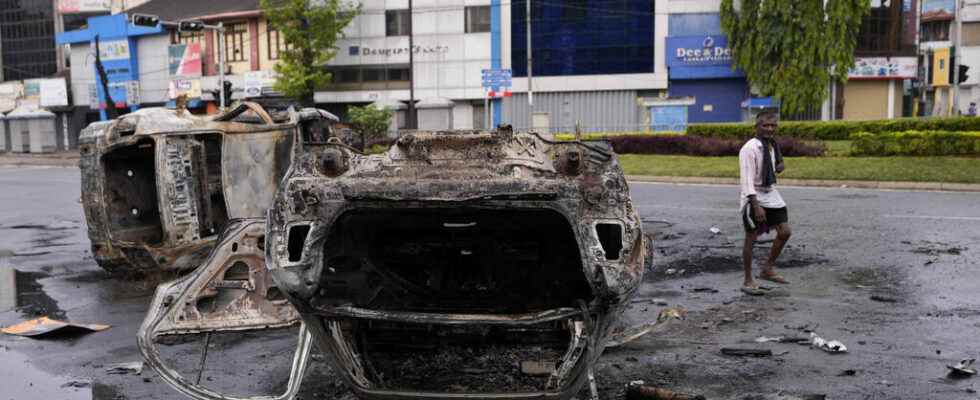The political crisis is worsening in Sri Lanka. This Monday, May 9, after deadly clashes between supporters of power and opponents, Prime Minister Mahinda Rajapaksa resigned. For months, the island has been experiencing an unprecedented crisis, blamed on the Covid-19 pandemic which deprived the country of foreign currency for the tourism sector, and aggravated by a series of bad political decisions, according to economists. An immediate and indefinite curfew has been decreed by the authorities.
Sri Lanka is sinking into violence. The army evacuated this Tuesday, May 10 before dawn resigning Prime Minister Mahinda Rajapaksa from his official residence in Colombo, to a safe place after thousands of protesters broke through one of the complex’s gates.
Monday was marked by the most serious violence in the country since the beginning of popular demonstrations demanding the resignation of the president, reports our correspondent in the region, Sebastien Farcis. Midday on Monday, supporters of the Prime Minister attacked peaceful protesters, sparking an escalation of violence that has inflamed the whole country, and pushed the Prime Minister to tender his resignation to his brother and President Gotabaya Rajapaksa. But tensions remained very high, in the capital Colombo and in other cities of the country.
beatings
It all started when hundreds of ruling party activists from the countryside ran into demonstrators peacefully camped outside the president’s residence in central Colombo and beat them with truncheons. The police did nothing to prevent them, and even protected them when the demonstrators fought back.
The attack unleashed the rage of demonstrators against the ruling Rajapakse dynasty, contained for a month: in the night, they burned down a dozen houses of deputies close to power and one of those of the Rajapakse.
The violence is not taking place only in the capital. About 50 kilometers to the north, a ruling party MP killed himself after opening fire on two anti-government protesters who were blocking his car. In southern Sri Lanka, another MP from the ruling party also fired on protesters. Two of them died instantly. In all, five people were killed and 150 others injured.
Call for the resignation of the president
For Mathiaparanan Abraham Sumanthiran, opposition MP for the Tamil National Alliance (TNA), the solution to the crisis lies in the total fall of the Sinhalese clan of the Rajapaksa in power, namely the resignation of Gotabaya Rajapaksa, president and brother of the Prime Minister: I think the president should resign immediatelyhe says. Until that happens, the crisis will not end. It has been 31 days since peaceful protesters have been calling on the president to resign. These protesters did not perpetrate any violence until Monday when violence was perpetrated against them. […] The clashes multiply. I repeat, the main cause of this crisis is the president, and he must resign immediately. »
While the President condemns the violence committed by the demonstrators, the United States Embassy in Colombo has denounced the violence perpetrated against peaceful protesters. A nationwide curfew has been imposed, in addition to the state of emergency established since this weekend, which offers the army more powers, but some protesters seemed too angry on Monday evening to respect these measures. Sri Lankans have been calling for the resignation of the executive for months, accused of having led the country into the wall following the pandemic.
” not enough dollars »
” IThey don’t have enough dollars to buy basic necessities like gasoline, medicine and food, explains Giacomo Mantovan, specialist in Sri Lanka at the Anthropology Research Center in Lisbon, joined by Vincent Souriau. So, there are shortages that greatly affect the population. Last month, Sri Lanka told the International Monetary Fund that it can no longer repay the external debt it defaulted on. The Covid-19 had already affected the island a lot on the health level, but especially on the economic level, because Sri Lanka lives from tourism. It is the primary source of income for Sri Lankans. Two years without tourism has affected Sri Lanka a lot. These protests started a few months ago. They went on a huge general strike with massive turnout. »
(with AFP)
